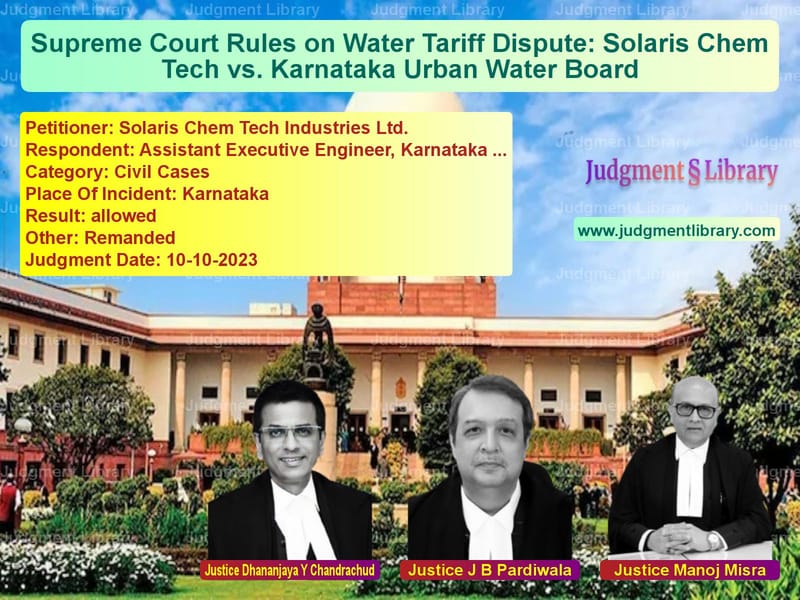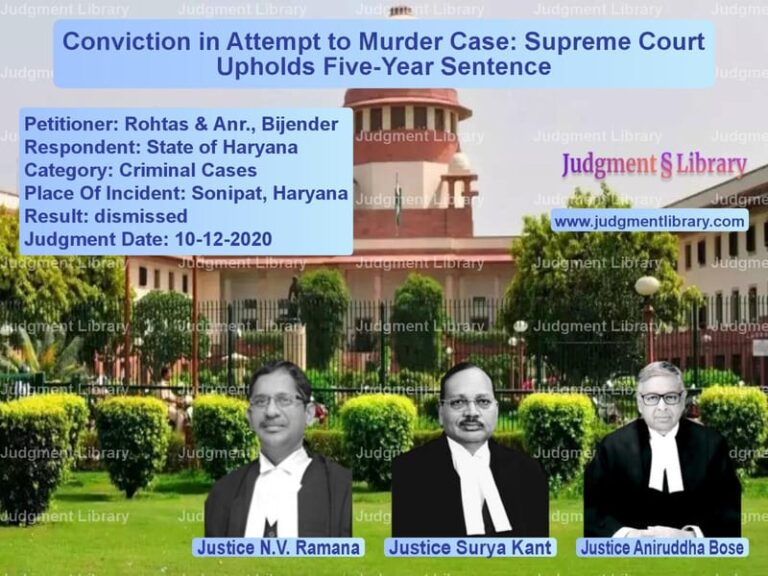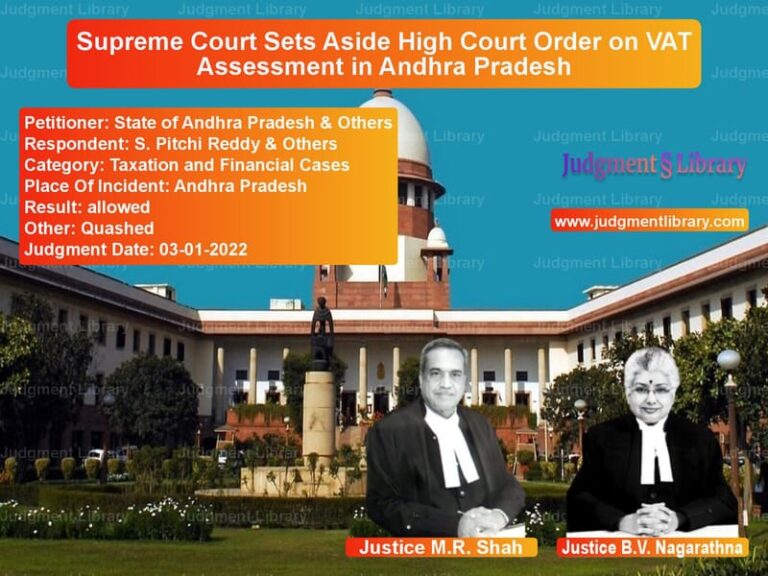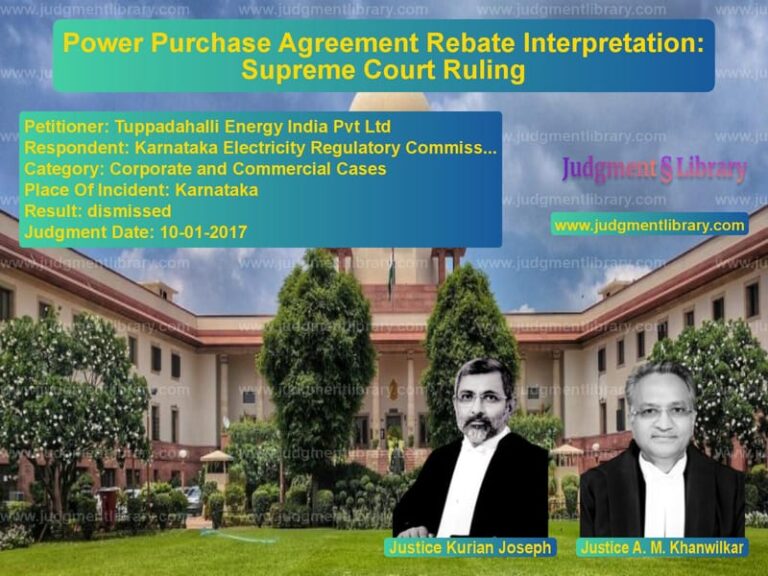Supreme Court Rules on Water Tariff Dispute: Solaris Chem Tech vs. Karnataka Urban Water Board
The Supreme Court recently delivered an important judgment in the case of Solaris Chem Tech Industries Ltd. vs. Assistant Executive Engineer, Karnataka Urban Water Supply and Drainage Board. The case revolved around a water tariff dispute between the appellant, Solaris Chem Tech Industries Ltd., and the Karnataka Urban Water Supply and Drainage Board. The legal battle originated from the Board’s demand for revised water tariffs, which the appellant contested under the terms of their contractual agreement.
Background of the Case
Solaris Chem Tech Industries Ltd. set up a factory in 1975 for manufacturing caustic soda in Binaga, Karnataka. The Karnataka government had entered into a long-term agreement with the company to supply water at concessional rates. However, disputes arose when the Karnataka Urban Water Supply and Drainage Board (KUWSDB), constituted in 1987, revised water tariffs and demanded arrears for the period from 2011 to 2014.
Under the agreement dated 11 November 2011, the Board was supplying water at:
- Rs. 18.40 per kL for industrial use
- Rs. 9.20 per kL for non-domestic use
However, in July 2014, the Board issued a demand notice increasing the tariff rates and requiring payment of arrears, with new rates applied retroactively from 2011. The revised water rates were:
- Rs. 28 per kL for industrial use (up to 8 kL)
- Rs. 36 per kL (8-15 kL)
- Rs. 44 per kL (15-25 kL)
- Rs. 52 per kL (above 25 kL)
The demand notice directed Solaris to pay Rs. 8,22,62,337 (8.22 crores) as arrears. The appellant objected to this sudden revision and filed a writ petition before the Karnataka High Court.
Arguments by the Petitioner – Solaris Chem Tech Industries Ltd.
Solaris Chem Tech Industries Ltd. contended that:
- The demand notice was arbitrary and contrary to the agreement between the parties.
- The tariff revision was retroactive and based on a government notification from 2011, which predated the agreement signed in 2011.
- The Board unilaterally revised water charges without following due process.
- Increasing rates without notice and imposing retrospective dues violated principles of natural justice.
- The dispute was of public importance and not limited to contractual terms, making it an appropriate subject for judicial review under Article 226.
Arguments by the Respondents – Karnataka Urban Water Supply and Drainage Board
The Board justified its action on the following grounds:
- The water supply operates on a no-profit-no-loss basis, and the Board needed funds to cover dues to Hubli Electricity Supply Company (HESCOM).
- The revised tariffs were based on a government order, which applied to all consumers.
- The agreement allowed the Board to revise rates as per government notifications.
- Solaris had continued to receive water supply and had not suffered any interruptions in operations.
- The agreement provided for a dispute resolution mechanism under Clause 11, which required disputes to be resolved by the Chief Engineer before approaching the court.
Decision of the Karnataka High Court
The Karnataka High Court dismissed the writ petition, holding that:
- The agreement included Clause 11, which required disputes to be resolved by mutual discussion and, if unsuccessful, referred to the Chief Engineer.
- The petitioners had agreed to submit disputes to the contractual dispute resolution mechanism.
- The court should not intervene in disputes governed by contractual terms unless there is a violation of fundamental rights or statutory provisions.
On appeal, the Division Bench upheld the Single Judge’s ruling, stating that since the agreement had a dispute resolution clause, judicial intervention under Article 226 was unwarranted.
Supreme Court’s Key Observations
The Supreme Court overturned the Karnataka High Court’s decision, making the following crucial observations:
- Clause 11 does not constitute an arbitration agreement: The Court held that Clause 11 of the agreement was merely a dispute resolution clause and not an arbitration clause under the Arbitration and Conciliation Act, 1996.
- The Chief Engineer is not an independent arbitrator: The Court pointed out that the Chief Engineer was an employee of the Board, raising concerns of impartiality.
- Mandatory arbitration must meet legal standards: A valid arbitration agreement must involve impartial adjudication. The dispute resolution mechanism in the agreement did not satisfy this requirement.
- High Court erred in declining jurisdiction: Since the dispute involved a question of law and statutory compliance, the High Court should have exercised its jurisdiction.
Supreme Court’s Final Ruling
The Supreme Court allowed the appeal and set aside both the Single Judge and Division Bench decisions of the Karnataka High Court. It ruled that:
- The writ petition should be restored to the Karnataka High Court for adjudication.
- The matter involved statutory interpretation and public interest, making judicial intervention appropriate.
- The Board cannot unilaterally impose retrospective tariff increases without due process.
- Until the High Court decides the case, Solaris must continue paying revised water rates while reserving its legal rights.
Implications of the Judgment
This judgment has far-reaching implications:
- Judicial Review in Contractual Disputes: The ruling reaffirms that High Courts can intervene in contractual matters if statutory violations are involved.
- Dispute Resolution Clauses: Companies entering agreements with public authorities should ensure that dispute resolution mechanisms comply with arbitration laws.
- Government Notifications and Contracts: Authorities must ensure that tariff changes do not violate existing agreements.
Conclusion
The Supreme Court’s verdict in this case underscores the importance of procedural fairness in government contracts. By ruling that Solaris Chem Tech Industries Ltd. was entitled to challenge the revised tariffs, the Court upheld the principle that no public authority can unilaterally alter contractual terms without following due process. The case now returns to the Karnataka High Court for final determination.
Petitioner Name: Solaris Chem Tech Industries Ltd..Respondent Name: Assistant Executive Engineer, Karnataka Urban Water Supply and Drainage Board.Judgment By: Justice Dhananjaya Y Chandrachud, Justice J B Pardiwala, Justice Manoj Misra.Place Of Incident: Karnataka.Judgment Date: 10-10-2023.
Don’t miss out on the full details! Download the complete judgment in PDF format below and gain valuable insights instantly!
Download Judgment: solaris-chem-tech-in-vs-assistant-executive-supreme-court-of-india-judgment-dated-10-10-2023.pdf
Directly Download Judgment: Directly download this Judgment
See all petitions in Contract Disputes
See all petitions in Public Interest Litigation
See all petitions in Judgment by Dhananjaya Y Chandrachud
See all petitions in Judgment by J.B. Pardiwala
See all petitions in Judgment by Manoj Misra
See all petitions in allowed
See all petitions in Remanded
See all petitions in supreme court of India judgments October 2023
See all petitions in 2023 judgments
See all posts in Civil Cases Category
See all allowed petitions in Civil Cases Category
See all Dismissed petitions in Civil Cases Category
See all partially allowed petitions in Civil Cases Category







